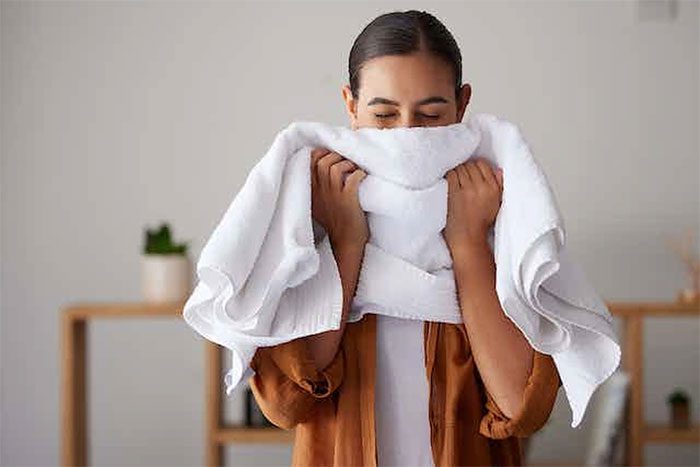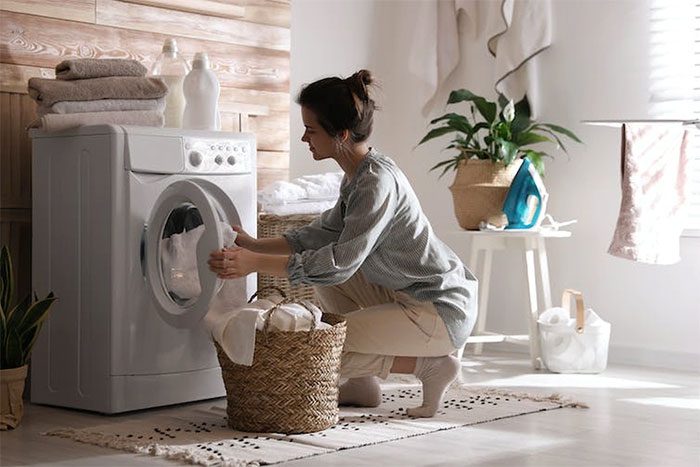Towels and duvet covers are used differently, so the frequency of washing them varies. So how often should you wash towels and change duvet covers?

Contact with bacteria in towels and bedding can cause asthma, rashes, or other skin infections.
It seems that everyone has their own opinion on how often to change and wash face towels, bath towels, and duvet covers. In a survey in the UK, nearly half of the single men surveyed reported that they typically change their duvet covers about every 4 months. Four months is clearly too long, but how often is just right?
Towels and duvet covers are used differently, so the frequency of washing them is also different. For duvet covers, changing them every 1 to 2 weeks is sufficient, while towels should ideally be washed daily or every few days.
Why Should Towels Be Washed More Frequently?
When you use a towel to dry yourself, you are “depositing” thousands of skin cells and millions of bacteria into it. Since you use towels to dry off after bathing, they often become damp. With duvet covers, you also “release” a significant amount of dead skin, bacteria, and sweat each night, but typically, these fabrics are less wet after a night’s sleep. Towels are also thicker than duvet covers, which means they tend to stay damp longer.
So how does the moisture level of the fabric affect the growth of microorganisms? Wet towels are breeding grounds for bacteria and mold. Mold particularly thrives in moist environments. Although you can’t see them, the unpleasant smell of towels is caused by mold.
Besides the unpleasant odor you have to endure, contact with bacteria on towels and duvet covers can lead to conditions such as asthma, allergies, rashes, or other skin inflammations.

Everyone has different opinions on how frequently duvet covers should be changed.
So How Often is Enough?
For bed linens, it depends on factors such as whether you shower right before bed or go to sleep after a day of sweating and only shower when you wake up. If you do not clean your body before going to bed, you need to wash duvet covers more often. In this case, you should change them once a week or at least every two weeks.
Bath towels should be washed more frequently, about every few days, while face towels need to be washed immediately after each use. Face towels get completely wet each time they are used, making them take much longer to dry and retaining more skin cells and microorganisms.
It’s best to wash towels at a high temperature, around 65 degrees Celsius, to effectively kill microorganisms. If you need to save energy, you can lower the temperature and add a cup of vinegar to the wash. Vinegar also acts as a disinfectant and helps prevent odors.
You should also clean the washing machine regularly and dry the folds of the rubber door seal after each wash, as this is a place where bacteria can easily develop.
Smelly Towels
What if you wash your towels frequently but they still have an unpleasant smell? One reason could be that you leave them in the washing machine too long after washing. Especially if you wash with warm water, the time it takes for the towels to cool down along with the moisture creates ideal conditions for bacteria to thrive. Experiments have shown that the number of bacteria can double every 30 minutes.
Therefore, it is crucial to hang your laundry immediately after washing, and it’s even better if you can dry them in sunlight. This way, the fabric will dry faster, and sunlight will also help the fabric smell fresher. In unfavorable weather conditions, you can use a tumble dryer as an alternative, but sunlight is still preferable.
One more thing to note is not to put wet towels in the laundry basket, as damp and dirty towels are ideal breeding grounds for microorganisms. From the moment you place a wet towel in the laundry basket until all the laundry is washed, the towel and other wet items can become smelly. By then, it will be very difficult to wash them completely clean and odor-free.

Towels need to be washed more frequently than duvet covers.
Are “Self-Cleaning” Fabrics Reliable?
Currently, there are some towels and bed linens marketed as “quick-dry” or “self-cleaning.” Quick-dry towels are made from synthetic fibers. These fibers are woven in a special way that helps them dry faster, thus preventing the growth of microorganisms and odors compared to towels that stay wet for a long time.
However, the concept of self-cleaning products is more complex. Most of these products contain silver or copper nanoparticles, which are antibacterial metals capable of killing microorganisms. These antibacterial compounds inhibit the growth of bacteria and help reduce odors, allowing you to wash less frequently.
However, these compounds do not clean dust, dirt, oil, dead skin, and sweat. Therefore, while the idea of self-cleaning products sounds appealing, they do not entirely possess that capability. Additionally, the overuse of antibacterial compounds like silver nanoparticles might cause microorganisms to become resistant and not be destroyed anymore.


















































